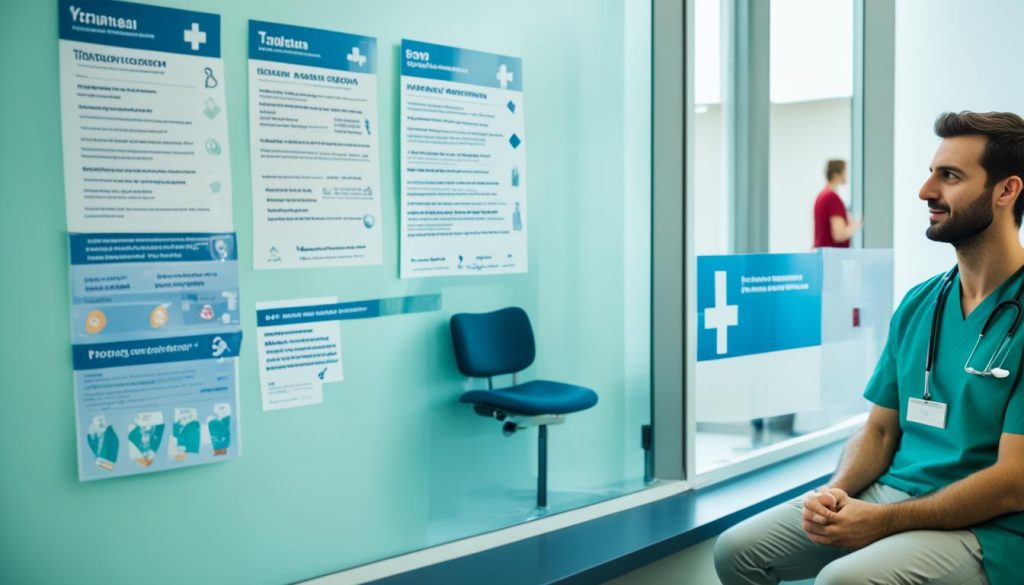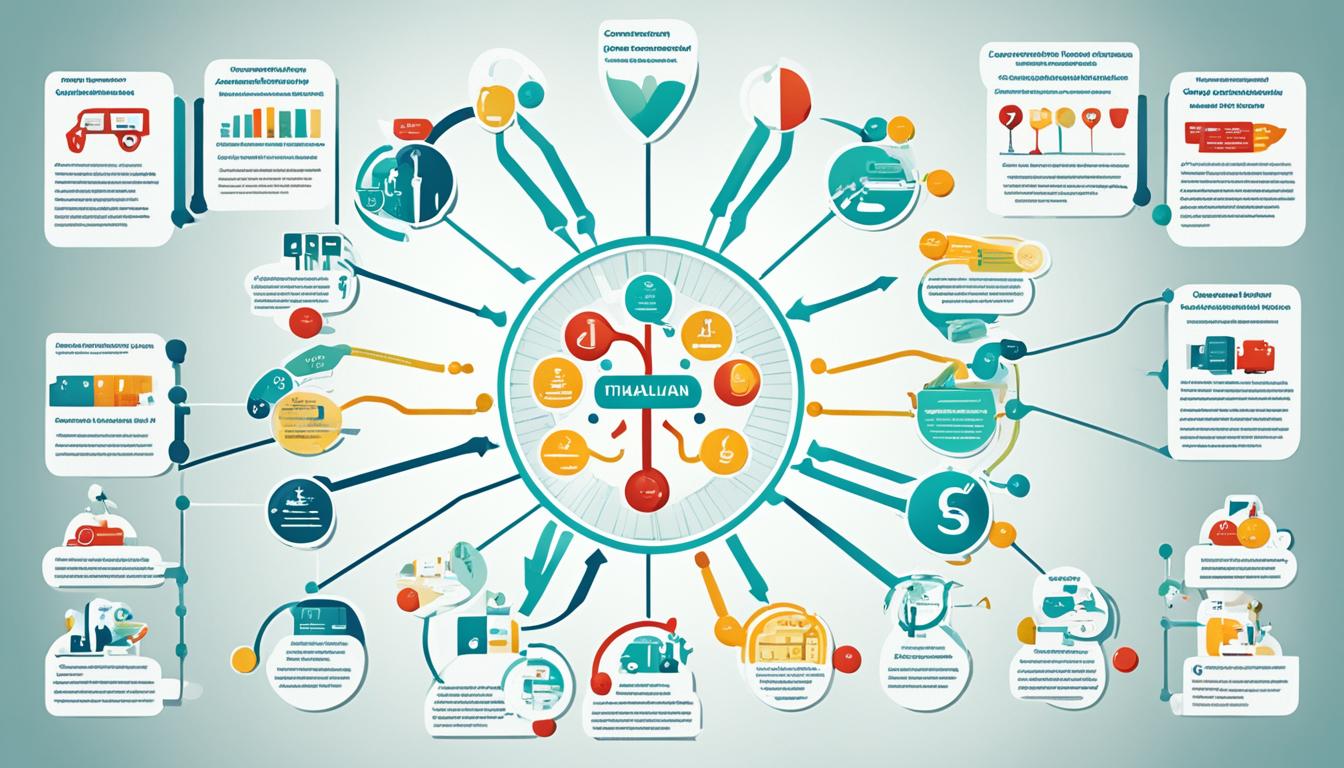Understanding the Italian healthcare system is key for those moving to or visiting Italy. This guide covers the basics of healthcare for expats and tourists. We’ll look at who can get medical care, insurance choices, and the quality of services. Italy uses a public healthcare model, so it’s important for newcomers to understand it to get the care they need.
Key Takeaways
- The Italian healthcare system is mainly public, offering services to both residents and visitors.
- Who can get healthcare varies, so knowing your rights is crucial for good care.
- Health insurance includes state plans and private options, fitting different needs.
- Expats should learn about local healthcare to move through the system easily.
- Language barriers can make getting care harder, so communication is key.
- Knowing about costs and fees helps with planning for healthcare expenses.
- In emergencies, knowing how to get urgent care is vital for a quick response.
Overview of the Italian Healthcare System
The Italian healthcare system is known for giving everyone access to health services. It started in 1978 and is run by the Servizio Sanitario Nazionale (SSN). This Italian healthcare overview shows how it works. It makes sure everyone gets the same healthcare, no matter their money.
The SSN’s main goals are to cover all health needs and keep quality high. The public health system Italy focuses a lot on preventing illnesses. This helps lessen the load on hospitals and benefits everyone. The SSN also works on health education, pushing people to look after their health.
Most of the money for healthcare comes from taxes. This money comes from both the national and local governments. This way, healthcare can keep up with new medical technology and facilities. Hospitals and clinics have the resources to offer a wide range of services for everyone’s health needs.
In summary, Italy’s healthcare system is all about making sure everyone is healthy and equal. It keeps up with the changing health scene in Europe.
Understanding the Structure of Italian Healthcare
The Italian healthcare system is complex and decentralised. The Italian Ministry of Health sets broad policies at the national level. But, regional authorities manage and deliver these services. Each region can adjust its healthcare to fit local needs, making it more responsive to public health.
This system means healthcare quality and access can vary across regions. Some areas might offer excellent healthcare, while others may struggle with quality and resources. This can lead to big differences in health outcomes for people based on where they live.
Local health units (Aziende Sanitarie Locali) play a big role in healthcare. They make sure health policies are followed on the ground. They manage hospitals and primary care, which is key for community health. Their success depends on the region’s decisions and funding.
This decentralised approach brings challenges. Regions with more resources can offer better care, but others might struggle. This means patient care can vary a lot. It’s important to keep checking on this and think about reforms to make things fairer across the country.
| Aspect | Regions with Strong Systems | Regions Facing Challenges |
|---|---|---|
| Access to Care | Immediate access to specialist services | Long waiting times for treatment |
| Funding | Well-funded health initiatives | Underfunded health programs |
| Quality of Services | High patient satisfaction ratings | Disparities in hospital quality |
| Health Outcomes | Lower morbidity and mortality rates | Higher rates of chronic diseases |
Accessing Healthcare in Italy

Getting healthcare in Italy means knowing how to register and understand the rules. It’s for both citizens and legal residents. You need a valid residency permit and to register with the SSN (Servizio Sanitario Nazionale) to get care.
Eligibility for Medical Care
To get healthcare in Italy, you must:
- Have a valid residency permit or be a citizen.
- Register with the SSN at the local health office.
- Provide ID and proof of where you live.
This helps you know your rights and what services you can use.
How to Register for Healthcare Services
Registering for health services in Italy is easy with these steps:
- Go to the local health office with your documents.
- Fill in the health service form.
- Show your ID, residency permit, and proof of where you live.
- Get your health card, which you need for healthcare.
This process usually takes a few days. It lets you use health services quickly. Following these steps makes registering smoother.
Italian Healthcare: Rights and Responsibilities
It’s key to know about patient rights in Italy for both locals and visitors. The Italian healthcare system gives patients basic rights for quality care. These rights include getting full medical treatment, keeping personal health info private, and giving consent before any treatment.
Italian laws and regulations support patient rights. They make sure healthcare workers respect patients’ dignity and choices. Patients get clear info on their health, treatment options, and risks. This helps patients make better health choices.
Knowing your rights in the Italian NHS is important. But, you also have duties as a patient. Telling your full medical history and following your treatment plan is crucial. This shows how important trust and clear talk are in healthcare.
The table below shows key rights and duties in Italian healthcare:
| Rights | Responsibilities |
|---|---|
| Access to medical care | Provide accurate medical history |
| Confidentiality of personal information | Follow prescribed treatment plans |
| Informed consent | Ask questions and seek clarification |
| Participate in decision-making | Attend scheduled appointments |
| Quality of care | Report any issues or concerns |
Types of Healthcare Services Available
Italy has a wide range of healthcare services for different needs. These services are offered through both public and private sectors. It’s important to know the differences between these services when looking for healthcare.
Public vs. Private Healthcare
The public private healthcare comparison in Italy shows big differences in how you get care. Public healthcare is mostly free and is paid for by taxes. It covers things like check-ups, hospital stays, and specialist care. But, you might have to wait a bit longer for non-urgent care.
Private healthcare, on the other hand, is faster but costs money. People might choose it for elective treatments or to skip long public waiting lists. Many private providers work with public healthcare, making it easier for patients to use both systems based on their needs and budget.
Emergency Services and Urgent Care
For emergency medical services Italy uses the Italian National Health Service (Servizio Sanitario Nazionale) a lot. This includes ambulances and first responders for serious emergencies. Always call 112 for an emergency.
For urgent but not life-threatening issues, hospitals and urgent care clinics are ready to help. Knowing how to get to these places can really help in an emergency.
Health Insurance in Italy

In Italy, you can choose from public and private health insurance. This gives everyone the chance to find the right coverage for their needs. Each option has its own set of benefits, suited for different health situations and preferences.
Public Health Insurance and Coverage
The Servizio Sanitario Nazionale (SSN) is Italy’s public health insurance. It covers citizens and residents fully. You get to use many healthcare services without paying at the time.
- Hospital care, including surgeries and inpatient services
- Visits to general practitioners and specialists
- Preventive measures, such as vaccinations and screenings
This system makes sure everyone has access to the healthcare they need. It helps keep the whole population healthy and well.
Private Health Insurance Options
Private health insurance in Italy offers more flexibility and faster service. These plans cover services not in the public plan. The main benefits are:
- Shorter wait times for elective procedures
- Access to a wider choice of medical facilities and specialists
- Private room accommodations during hospital stays
With private insurance, you can choose how you want your healthcare to be. This makes you happier with your medical care overall.
| Feature | Public Health Insurance | Private Health Insurance |
|---|---|---|
| Cost | Generally free at point of service, funded by taxes | Monthly premiums vary by plan |
| Wait Times | Longer for non-urgent services | Shorter, often prioritising elective care |
| Choice of Providers | Limited to public facilities | Greater freedom in choosing doctors and hospitals |
| Coverage of Additional Services | Basic medical services | Expanded options including dental and eye care |
Quality of Care in the Italian Healthcare System
The quality of healthcare in Italy is a big topic. It varies a lot across different areas. This depends on the local economy and resources. We look at patient satisfaction, hospital standards, and treatment results to judge the care quality.
Patient surveys give us a peek into what patients think of their care. Regular checks make sure healthcare meets the required standards. This keeps the quality of care consistent everywhere.
To improve care, Italy has started programs. These focus on training doctors, updating technology, and giving patients access to the latest treatments. These steps are key to better healthcare in Italy, making patients happier, and ensuring they get the care they need.
The Italian National Health Service and WHO guidelines lead these efforts. They aim to make healthcare better for everyone. They work to fix differences in healthcare access and quality, aiming for the same standard everywhere.
Improving healthcare is a continuous process in Italy. It ensures people get great care. Keeping an eye on healthcare standards and patient satisfaction is crucial for the future of Italy’s healthcare.
| Quality Metric | Current Status | Future Aim |
|---|---|---|
| Patient Satisfaction Rate | 75% Satisfaction | 85% Satisfaction by 2025 |
| Hospital Accreditation | 60% Accredited Hospitals | 80% Accredited Hospitals by 2025 |
| Successful Treatment Outcomes | Varies by Region | Standardized Outcomes Across Regions |
Finding a Doctor or Specialist in Italy
In Italy, finding the right healthcare professional is key to staying healthy. You start by looking for a good general practitioner. This doctor is your first contact for health advice and treatment. They help you navigate the healthcare system. Knowing how to pick a GP and get specialist referrals can make your healthcare better.
Choosing a General Practitioner
Choosing a GP means looking at several things. Friends or family who know the local healthcare scene can give good advice. Online platforms and directories also list GPs, making it easier to find one. When you have a few options, think about:
- Location and accessibility
- Languages spoken
- Availability of appointments
- Patient reviews and testimonials
Specialist Referrals and Consultations
Once you have a GP, you might need specialist care for certain conditions. This starts with a consultation to see if specialist care is needed. If you need a specialist, your GP will help find one and set up an appointment. Important things to consider are:
- Understanding the reason for referral
- Identifying specialists within the NHS or private sector
- Verifying credentials and specialisations
Working with your GP is key to good healthcare. They will keep helping you manage your care, even after you see a specialist.
| Factor | Considerations |
|---|---|
| Location | Proximity to home or workplace |
| Languages | Ability to communicate effectively |
| Appointment Availability | Frequency and length of waiting times |
| Patient Reviews | Feedback from other patients’ experiences |
Language Barriers in Italian Healthcare
Language barriers can make it hard for non-Italian speakers to get through the Italian healthcare system. Patients often struggle to talk about their health or understand their treatment options. This can lead to misunderstandings.
One way to beat these language barriers is to look for English-speaking doctors in Italy. Many doctors, especially in big cities, speak English well. They can make consultations easier for those who don’t speak Italian. Websites and forums for expats often list places to find English-speaking doctors, helping newcomers.
Patients can also use translation services to help with communication. These services can interpret during visits or translate medical papers. Health authorities often give tips on how to find these services, making healthcare communication smoother.
Getting your medical info ready can also help with language barriers. Make sure to have details like your health history, medicines, and allergies ready. This helps doctors understand your needs better and gives them the info they need to care for you well.
| Strategy | Description |
|---|---|
| Seek English-speaking doctors | Find healthcare professionals fluent in English for effective consultations. |
| Utilise translation services | Access interpretation services to facilitate communication during appointments. |
| Prepare medical information | Compile essential health details in advance for smoother consultation. |
Costs and Fees Associated with Healthcare
Understanding healthcare costs in Italy is key for those needing medical care. Many services are free with the National Health Service (SSN). But, some treatments require co-payments. Knowing these costs helps in making smart healthcare choices. Budgeting for healthcare is important to plan for unexpected costs.
Understanding Co-payments and Fees
Co-payments are a big part of Italy’s healthcare. You might pay fees when seeing a specialist or getting certain medicines. These fees depend on the service, your age, and your healthcare system. Here’s a table showing common co-payment amounts for different services:
| Service | Co-payment Amount |
|---|---|
| General Practitioner Visit | €20 |
| Specialist Visit | €30 |
| Emergency Room Visit | €50 |
| Prescription Medication | €5 (up to €50 max) |
Budgeting for Healthcare Expenses
When budgeting for healthcare in Italy, think about both expected and unexpected costs. Saving money each month for healthcare can ease financial stress. Make sure to include money for regular doctor visits, specialist care, and any planned medical treatments.
Looking into your personal finances and understanding your insurance is also wise. This helps avoid unexpected costs later.
Healthcare for Expats in Italy
Expat healthcare in Italy can be tricky, especially for those new to the system. It’s key to grasp how healthcare works here. Expats need to know their rights and what’s expected of them in Italy’s healthcare system. This can be quite different from what they’re used to back home.
What Expats Need to Know
First off, expats must register for healthcare in Italy. This gets them into both public and private healthcare. They’ll need to show proof of where they live, who they are, and their health insurance info. It’s important to look into both public and private health insurance options in Italy.
Common Healthcare Challenges for Expats
Italy has a good healthcare system, but expats might still face hurdles. Language barriers can make talking to doctors hard. Also, understanding how to handle co-payments and bills can be tricky. To help, expats should reach out to local health authorities and groups for expats. Joining local groups can also make it easier to get used to the healthcare system in Italy.
Navigating Italian Healthcare as a Tourist

When you visit Italy, it’s key to be ready for medical emergencies. Knowing how to handle healthcare for tourists in Italy can make things easier if you face unexpected health issues. Here are important steps to follow in a medical emergency, plus tips on picking clinics and hospitals while you’re away.
What to Do in a Medical Emergency
If you have a medical emergency in Italy, call the emergency services right away. The number to dial is 112, and it’s free from any phone. Tell them about your health issue and where you are to get help quickly.
Always have important phone numbers handy, like your hotel’s address and any health info, like allergies. This helps in emergencies.
Choosing Clinics and Hospitals While Travelling
Choosing the right healthcare place is crucial when you’re in Italy with health concerns. Think about these things when picking hospitals:
- Proximity: Pick clinics and hospitals close by, especially in cities where there are many options.
- Services Offered: Check what services they provide, including special areas that match your health needs.
- Credibility: Look up places through local guides or tourist info to find trusted medical spots.
Knowing these things helps you make smart choices about healthcare while you’re there.
Advocating for Yourself in Healthcare Situations
In Italy, advocating for yourself in healthcare is crucial. It helps you get better care and be happier with your treatment. Knowing your rights and what you should do in healthcare is key.
Talking clearly with your doctors is important. You should tell them about your concerns, questions, and what you prefer. Before meetings, make a list of your symptoms, medicines, and past health issues. This helps you talk better with your doctors and make joint decisions.
- Understand medical rights and entitlements.
- Document all interactions with healthcare providers.
- Know the complaints process for unresolved issues.
- Seek assistance from patient advocacy groups if needed.
In Italy, there are many resources to help patients. Guides on healthcare consumer rights can explain the healthcare process better. Learning about local healthcare policies helps you speak up and get the care you need.
Being proactive in advocating for yourself makes healthcare fairer for everyone. Don’t be shy about sharing what you need and want. Good communication improves your relationship with your healthcare team and makes you happier with your care.
Future Trends in the Italian Healthcare System
Looking ahead, Italy’s healthcare is set for big changes. These changes aim to make healthcare more efficient and improve the patient experience. The Italian Ministry of Health has outlined plans to focus on preventive care and use new technologies.
This will help meet the changing needs of the population. The goal is to make healthcare easy to reach for everyone, whether living in Italy or just visiting.
Telemedicine is becoming a big part of healthcare in Italy. It’s changing how patients talk to doctors. The OECD says more Italians are using online consultations and digital check-ins.
This makes getting medical help easier and less stressful. It also helps ease the load on hospitals. This is good news for a healthier healthcare system.
There’s also talk about spending more on mental health and managing chronic diseases. As Italy’s healthcare advances, new care models are being introduced. These aim to better patient outcomes and take a more complete view of health.
These changes mark a big shift in healthcare. They promise to change healthcare for Italians and visitors alike.
FAQ
What is the Italian healthcare system?
The Italian healthcare system is called Servizio Sanitario Nazionale (SSN). It’s a public service that gives everyone living in Italy access to healthcare. It started in 1978 and aims for everyone to have health coverage and equal access to services.
How can expats access healthcare in Italy?
Expats can get healthcare in Italy by joining the SSN. They need to have a valid residency permit and the right documents. This way, they get the same healthcare as Italian people.
What are the main types of healthcare services available in Italy?
Italy has both public and private healthcare. Public healthcare is paid for by taxes and is mostly free. Private healthcare is quicker but costs more.
Are there language barriers in the Italian healthcare system?
Yes, language can be a problem for those who don’t speak Italian. It’s best to find doctors who speak English, use translation services, and have your medical info ready to help communicate better.
What do patients need to know about their rights in the Italian healthcare system?
Patients in Italy have the right to medical care, privacy for their health info, and to give consent for treatments. They also need to give accurate health histories.
What should tourists do in a medical emergency in Italy?
If there’s a medical emergency, tourists should call emergency services and go to the nearest hospital or clinic. It’s important to have important phone numbers and choose healthcare places wisely.
How does health insurance work in Italy?
The public health insurance under the SSN covers hospital care, specialist visits, and preventive care. Some might also get private insurance for more services and quicker treatment times.
What are common healthcare challenges faced by expats in Italy?
Expats often face challenges like registering, understanding who can join, and finding good healthcare providers. Help from community groups and expat networks can be very useful.
How can individuals advocate for themselves in the Italian healthcare system?
People should speak up by talking to healthcare workers, knowing their health rights, and dealing with any problems they find in the system.
What future trends are anticipated in the Italian healthcare system?
The future might bring new tech, more telemedicine, and policy changes to make healthcare better for everyone living in or visiting Italy.









